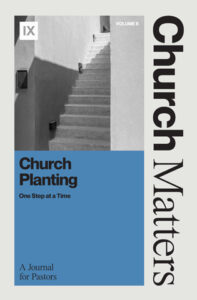
Church Planting
Preparing to Church Plant
The Priority of Patience, Prayer, and Preaching in Church Planting
by Josh Manley
Why Not to Plant Churches
by Phil Newton
Preparing to Plant Is a Whole Church Effort
by Dwayne Milioni
You Can’t Plant a Church If You Don’t Know What a Church Is
by Nathan Knight
Partnering Together to Plant
by Nathan Akin
Pastor, Not Entrepreneur
by Nathan Knight
Pastor, Not Entrepreneur, Part 2
by Matt McCullough
Five Trends in Church Planting
by Phil Newton and Matt Rogers
What 9Marks Purists Should Know About Church Planting
by Ed Stetzer
Sending Out a Church Plant
Taking Risks in Church Planting by Sending Your Best Members and Elders
by Juan Sanchez
Should I Stay or Should I Go? Advice for Members on Church Plants
by John Joseph
Sending Out Future Leaders Strategically
by Matt Rogers
Equipping Women for Church Planting
by Sharon Dickens
Shepherding the Heart in Sending
by Dave Kiehn
Planting a Church
Stop Launching Churches, Covenant Together Instead
by Nathan Knight
Personal Evangelism for the Church Planter and the Church Plant
by J. Mack Stiles
Planting Churches for Pleasure, Not for Profit
by Nathan Knight
Four Encouragements for Preaching in a Church Planting Context
by Clint Darst
Church Planting Is Rarely Rapid
by Matthew Spandler-Davison
The Church Planter’s Second Priority: Raising Up Leaders
by Mike McKinley
How to Do Ministry When You Have No Money
by Brian Davis
Church Planting Across Ethnic Lines
by Joel Kurz
International Churches as Strategic Gospel Multipliers
by Caleb Greggson
Revitalization with an Eye Toward Church Planting
by Matt Capps
Church Planters, Don’t Wait to Put Your Documents in Place!
by Joel Kurz
Church Planters, Make Sure Your People Know You Love Them
by Steve Jennings
Church Planting in the Same Building
by Matthew Spandler-Davison
Church Planting by Peaceable Division
by Colin Clark
Church Planting in Hindsight
Church Planting Roundtable: Counting the Cost
by Forrest, Joseph, San, Chatman, Greggson, and Ross
The Blessings and Burdens of a Church Planter’s Wife
by Gloria Furman
Lessons Learned from a Church Planter’s Wife
by Jenny Manley
Why Bad Polity Hurt My Church Plant
by Phil Newton
Knowing When to Say When: Reflections from a Failed Church Plant
by Derek Bass
Editor’s Note:
First, a word of thanks to our friends at Pillar Church Planting Network (especially Phil Newton and Matt Rogers) and 20Schemes (especially Matthew Spandler-Davison) for their help on this edition of Church Matters. Both ministries have spent more time thinking about church planting than 9Marks has, especially on the practical nuts and bolts of planting. That’s why we thought they would be great partners to work with for this edition.
Several themes emerge throughout this volume. Let me mention two. First, church plants and planters are sometimes treated as something other than churches and pastors. They’re not. Plants are churches, planters are pastors. Say it twice if it will help you remember.
The reason to emphasize this is, the whole world of church planting literature, programs, assessment tools, and workshops over the last few decades too often takes its cues from the business world rather than the Bible. Yet we want your church to think about those would-be planters like you would a would-be pastor—according to the qualifications and competencies highlighted by the apostles.
We also want you to think about those plants as churches. Many times, I’ve heard a planter talk about his one-, two-, or five-year-old “church plant.” I’ll ask him if they take the Lord’s Supper. When he says yes, I suggest he doesn’t need to call it a plant anymore. It’s a church now, with all the rights, duties, and privileges thereof. My goal in saying that is both to empower him—“Baby’s all grown up!”—but also to subtly remind him that what his church does is constrained by Scripture. The Bible governs churches.
For more on this very theme, see Nathan Knight’s excellent new book Planting By Pastoring.
A second theme that emerges throughout this volume is the connection between churches and their plants. Biblically ordered and healthy churches tend to plant biblically ordered and healthy churches. Biblically disordered and unhealthy churches tend to plant the same. That’s not to say you need to wait till your church is in tip top health before planting. It does mean that what your church aspires to will transfer. After all, kids value what their parents value. That means the first step of planting might be to consider your own church’s health.
We at Pillar, 20Schemes, and 9Marks pray you find this edition of Church Matters edifying and instructive.
—Jonathan Leeman
Free Download
PDF file will be sent to this email address. As part of our community, you will receive content & communication from 9Marks. You may unsubscribe at any time.
